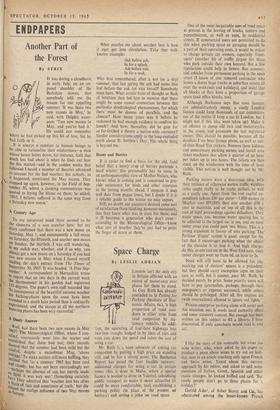ENDPAPERS
Another Part of the Forest
By STRIX is‘ It is always a comfort to human beings to be able to rationalise their misfortunes—a man whose house burns down, for instance, feels that much less bad about it when he finds out how the fire started—and in the sodden weeks that followed I heard a number of theories advanced to account for the bad weather; but nobody, as it happened, mentioned the May moons. They Cropped up again, however, in the Field of Sep- tember 30, where a farming commentator was quoted as laying the blame on them; he added, 1865, I believe, suffered in the same way from a Saturday new moon.' it happened, mentioned the May moons. They t. A Century Ago To my untutored mind there seemed to be the elements of a non sequitur here; but my diary confirmed that there was a new moon on Saturday, May 1, and consequently a full moon on Saturday, the fifteenth, and another new moon on Sunday, the thirtieth. I was still wondering, 11; my oafish way, whether, and if so why, you always got a new moon on a Saturday if you had two new moons in May when I found myself reading the day's extract from The Times of September 30, 1865. It was headed, 'A Fine Sep- tember., A correspondent in Morayshire wrote to report that on two days in the current week the thermometer in his garden had registered 110 degrees. The paper's own staff recorded that In consequence of the beautiful autumn weather the bathing-places upon the coast have been crowded to a much later period than is ordinarily experienced, and the season at all the northern Watering places has been very successful.'
Dusty Answer
Well, had there been two new moons in May 1865? The Meteorological Office, whom I con- sulted, courteously went into the matter and established that there had not; their records showed that the summer had been mild but the rainfall, despite a monolunar May, 'above To make matters still more baffling, they insisted that 'as a summer 1965 has been cool and cloudy, but has not been outstandingly wet :1Perhaps the absence of sun has merely made s tIlink it was very wet.' (Something certainly has') They admitted that 'weather lore has often o basis of fact and sometimes of truth,' but dis- 1,nissed the malign influence of two May moons as fantasy. What puzzles me about weather lore is how it ever got into circulation. Take that well- known example:
Oak before ash, In for a splash. Ash before oak, In for a soak.
Who first remembered, after a wet (or a dry) summer, that last spring the ash had come into leaf before the oak (or vice versa)? Somebody must have. What erratic train of thought or flash of intuition then led him to surmise that there might be some causal connection between this particular dendrological phenomenon, for which there must be dozens of parallels, and the climate? How many years was it before he reckoned he had enough evidence to confirm his hunch? And how, thereafter, did he gain for so far-fetched a theory a nation-wide currency? Similar considerations apply to the long-exploded myth about St. Swithin's Day. The whole thing is beyond me.
Roots and Berries It is easier to find a basis for the old, fond belief that a heavy crop of berries portends a hard winter; this presumably has its roots in an anthropomorphic view of Mother Nature, who knows what is coming and is concerned to pro- vide sustenance for birds and other creatures in the testing months ahead. I suppose it may well date from pagan times, but I doubt if it is a reliable guide to the winter we may expect.
Still, no doubt our ancestors derived some sort of satisfaction from thinking, however mistakenly, that they knew what was in store for them; and it ill becomes a generation who don't even— according to the Meteorological Office—know what sort of weather they've just had to point the finger of scorn at them.






































 Previous page
Previous page